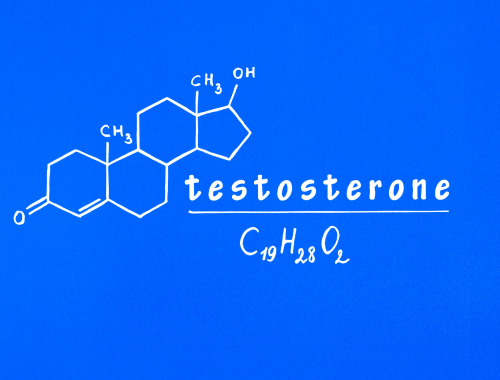Difference Between DHEA and Testosterone
DHEA or dehydroepiandrosterone, is an important steroid sex hormone in the human body, from which other sex hormones are later derived. Testosterone is the androgen that is responsible for the development of male sexual characteristics.

What is DHEA?
Definition:
DHEA or dehydroepiandrosterone, is an important steroid sex hormone in the human body, from which other sex hormones are later derived.
Production:
DHEA is synthesized by adrenal glands. It breaks down into male and female sex hormones. Estrogen and testosterone are derivatives of DHEA. Foods like yam and soy are rich in DHEA and are used to produce synthetic DHEA.
Sources:
There are no exclusive food sources for increasing DHEA levels.
Importance:
DHEA supplements have an anti-inflammatory effect which is why they are used in inflammatory disorders like lupus, rheumatoid arthritis, and inflammatory bowel disease. DHEA is beneficial in treating erectile dysfunction, cancer, ischemic heart disease, adrenal failure, premature ovarian failure, and osteoporosis. It is also used in psychiatric diseases such as Alzheimer’s disease, and schizophrenia.
During pregnancy:
DHEA supplements are not recommended during pregnancy.

What is Testosterone?
Definition:
Testosterone is the androgen that is responsible for the development of male sexual characteristics.
Production:
Testosterone is secreted by gonads that is testicles in males and ovaries in females. DHEA released by adrenal glands is also converted to testosterone.
Sources:
Athletes take synthetic testosterone that comes in injections or supplements. These are detrimental to health and only natural form of testosterone is beneficial for muscle building.
Importance:
Testosterone surge at puberty is responsible for increasing height, causing facial and pubic hair growth, increasing sex drive, and causing an increase in the size of the testes and penis. In male adults, it causes an increase in bone and muscle mass and an increase in libido.
Difference between DHEA and Testosterone
Definition:
DHEA or dehydroepiandrosterone, is an important steroid sex hormone in the human body, from which other sex hormones are later derived.
Testosterone is the androgen that is responsible for the development of male sexual characteristics.
Production:
DHEA is synthesized by adrenal glands. It breaks down into male and female sex hormones. Estrogen and testosterone are derivatives of DHEA. Foods like yam and soy are rich in DHEA and are used to produce synthetic DHEA.
Testosterone is secreted by gonads that is testicles in males and ovaries in females. DHEA released by adrenal glands is also converted to testosterone.
Sources:
There are no exclusive food sources for increasing DHEA levels. Athletes take synthetic testosterone that comes in injections or supplements. These are detrimental to health and only natural form of testosterone is beneficial for muscle building.
Importance:
DHEA supplements have an anti-inflammatory effect which is why they are used in inflammatory disorders like lupus, rheumatoid arthritis, and inflammatory bowel disease. DHEA is beneficial in treating erectile dysfunction, cancer, ischemic heart disease, adrenal failure, premature ovarian failure, and osteoporosis. It is also used in psychiatric diseases such as Alzheimer’s disease, and schizophrenia.
Testosterone surge at puberty is responsible for increasing height, causing facial and pubic hair growth, increasing sex drive, and causing an increase in the size of the testes and penis. In male adults, it causes an increase in bone and muscle mass and an increase in libido.
Table of differences between DHEA and Testosterone

FAQs
Is DHEA the same as testosterone?
DHEA or dehydroepiandrosterone, is one of the most common circulating steroid hormones in the human body, which is also a precursor to the human sex hormones. Testosterone is the androgen that is responsible for the development of male sexual characteristics.
Does DHEA increase testosterone?
Yes.
Should you take DHEA if you take testosterone?
It is not advisable to take DHEA with testosterone.
How does DHEA become testosterone?
DHEA is converted to androstenedione which then breaks into testosterone.
Who should not take DHEA?
People having heart disease, high cholesterol, high blood pressure, polycystic ovarian syndrome, and thyroid problems should not take DHEA.
Does DHEA cause weight gain?
Yes.
- Differences Between Reptiles and Amphibians - May 17, 2024
- Difference Between Ophthalmology and Optometry - May 15, 2024
- Difference Between Fear and Anxiety - April 2, 2024
Search DifferenceBetween.net :
Leave a Response
References :
[0]Nestler, John E., John N. Clore, and William G. Blackard. "Metabolism and actions of dehydroepiandrosterone in humans." The Journal of steroid biochemistry and molecular biology 40.4-6 (1991): 599-605.
[1]Nieschlag, E., T. Walk, and A. E. Schindler. "Dehydroepiandrosterone (DHA) and DHA-sulfate during pregnancy in maternal blood." Hormone and Metabolic Research 6.02 (1974): 170-171.
[2]Kelly, D. M., and T. H. Jones. "Testosterone and obesity." Obesity Reviews 16.7 (2015): 581-606.
[3]Image credit: https://www.canva.com/photos/MAD35Z71QiY-dehydroepiandrosterone-dhea-hormone-and-white-pills-/
[4]Image credit: https://www.canva.com/photos/MADA6rF0hoE-testosterone/
